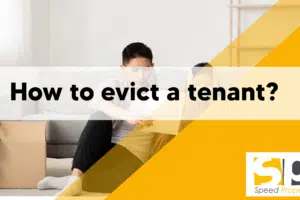Help I’m getting evicted!
Help! I’m Being Evicted
Facing eviction can be a stressful experience, but understanding your rights and options can help you manage the situation effectively.
An eviction is a legal process used by landlords to ask tenants to leave their property. Landlords must always follow strict legal procedures. If they do not, the eviction may not be valid, and tenants have the right to challenge it.
Before a landlord can begin eviction proceedings, they must issue a valid eviction notice. This notice should clearly state the eviction date and the reason for eviction. The type of notice depends on your tenancy agreement. Common reasons for eviction include unpaid rent, breaking tenancy rules, or antisocial behaviour. The landlord must clearly prove these reasons if challenged in court.
If you believe the eviction notice is not valid, you can challenge it. Seeking free legal advice from a local charity or organisation can help you understand how best to respond. You may also speak directly with your landlord to negotiate a solution, such as paying overdue rent or resolving the issue causing the eviction.
If negotiation doesn’t work, you can challenge the eviction officially by filling in form N244, available from your local court. Housing associations or your local council may also offer support and guidance on this.
When a court approves eviction, bailiffs carry out the eviction itself. They must give you at least two weeks’ notice before eviction day. Even at this late stage, tenants can still contact court bailiffs if they believe the eviction process is unfair or incorrect.
Different types of tenancy agreements have specific rules:
Assured shorthold tenancies are the most common. Landlords must give tenants at least two months’ written notice. If the notice isn’t valid, tenants can challenge it.
Fixed-term tenancies last for a specific period. Eviction during this period can only happen for certain valid reasons. If those reasons are not justified, the eviction can be contested.
Excluded tenancies are informal agreements where landlords only need to give tenants reasonable notice to leave. Again, the tenant can challenge if the notice seems unreasonable or invalid.
Evictions require a court order to be enforceable. If the court order has been wrongly issued, tenants have the right to challenge it with support from housing associations or local councils.
| Tenancy Type | Notice Required for Eviction | Typical Reasons for Eviction |
|---|---|---|
| Assured Shorthold Tenancy (AST) | At least 2 months’ written notice (Section 21) | Rent arrears, breach of tenancy agreement, landlord reclaiming property |
| Fixed-Term Tenancy | Typically at least 2 months’ written notice; can vary | Breaking tenancy agreement, rent arrears, antisocial behaviour |
| Excluded Tenancy (e.g., lodgers) | Reasonable notice, usually between 1 and 4 weeks | Landlord’s personal discretion, less formal agreement, no formal reason needed |
Excluded tenancies are informal agreements where landlords only need to give tenants reasonable notice to leave. Again, the tenant can challenge if the notice seems unreasonable or invalid.
Evictions require a court order to be enforceable. If the court order has been wrongly issued, tenants have the right to challenge it with support from housing associations or local councils.
To prevent eviction, tenants should aim to resolve issues quickly. Paying rent arrears, addressing tenancy breaches, or negotiating with landlords early can help avoid eviction altogether. If eviction is unavoidable, tenants should seek help immediately from local councils or housing associations for rehousing options. Charities and other organisations can also provide practical and emotional support during this challenging time.
Ultimately, eviction can have serious impacts, but knowing your rights and seeking help early can significantly improve your situation. Always reach out for legal advice or local support if you’re facing eviction.
Understanding Eviction
Eviction is a legal process that allows a landlord to remove a tenant from a rental property. It’s essential to understand the eviction process and your rights as a tenant to ensure you’re treated fairly. The eviction process can be complex and daunting, but being informed about the steps involved and your legal protections can make a significant difference. Knowing your rights and options can help you navigate the situation more effectively and ensure that you are not unfairly treated.
Eviction Notices and Process
The eviction process typically begins with a notice from your landlord, which must be served correctly and include specific information. The type of notice and the notice period will depend on the type of tenancy agreement you have and the reason for the eviction. For instance, a Section 21 notice is used for ‘no-fault’ evictions in assured shorthold tenancies, requiring at least two months’ notice. A Section 8 notice, on the other hand, is used when the tenant has breached the tenancy agreement, such as by falling into rent arrears. Understanding the different types of eviction notices and the procedures that must be followed is crucial. If the notice is not served correctly, it may not be valid, giving you grounds to challenge the eviction.
Reasons for Eviction
There are various reasons why a landlord may want to evict a tenant, including rent arrears, breach of tenancy agreement, and anti-social behavior. Rent arrears are one of the most common reasons where tenants fall behind on their rent payments. Other reasons might include causing damage to the property, violating terms of the tenancy agreement, or engaging in behavior that disrupts neighbors. If you’re facing eviction, it’s essential to understand the reason for the eviction and the grounds on which the landlord is relying. This will help you determine the best course of action and whether you can challenge the eviction.
Challenging an Eviction
If you believe the eviction is unfair or the landlord has not followed the correct procedures, you may be able to challenge the eviction. This can involve seeking free legal advice, negotiating with your landlord, or applying to the court to stop the eviction. It’s essential to act quickly and seek advice as soon as possible to ensure you have the best chance of success. Free legal advice can be obtained from local charities, housing associations, or legal aid services. They can guide you through the process and help you understand your rights and options.
Emergency Housing and Support
If you’re facing eviction and have nowhere to go, you may be eligible for emergency housing and support. Your local council may be able to provide temporary accommodation or help you find a new place to live. Additionally, various charities and organisations offer support and advice for people facing homelessness. It’s essential to seek help as soon as possible to ensure you have access to the support you need. Emergency housing can provide a temporary solution while you work on finding a more permanent place to live. Local councils and housing officers can assist in creating a personal housing plan tailored to your situation.









Comments (0)